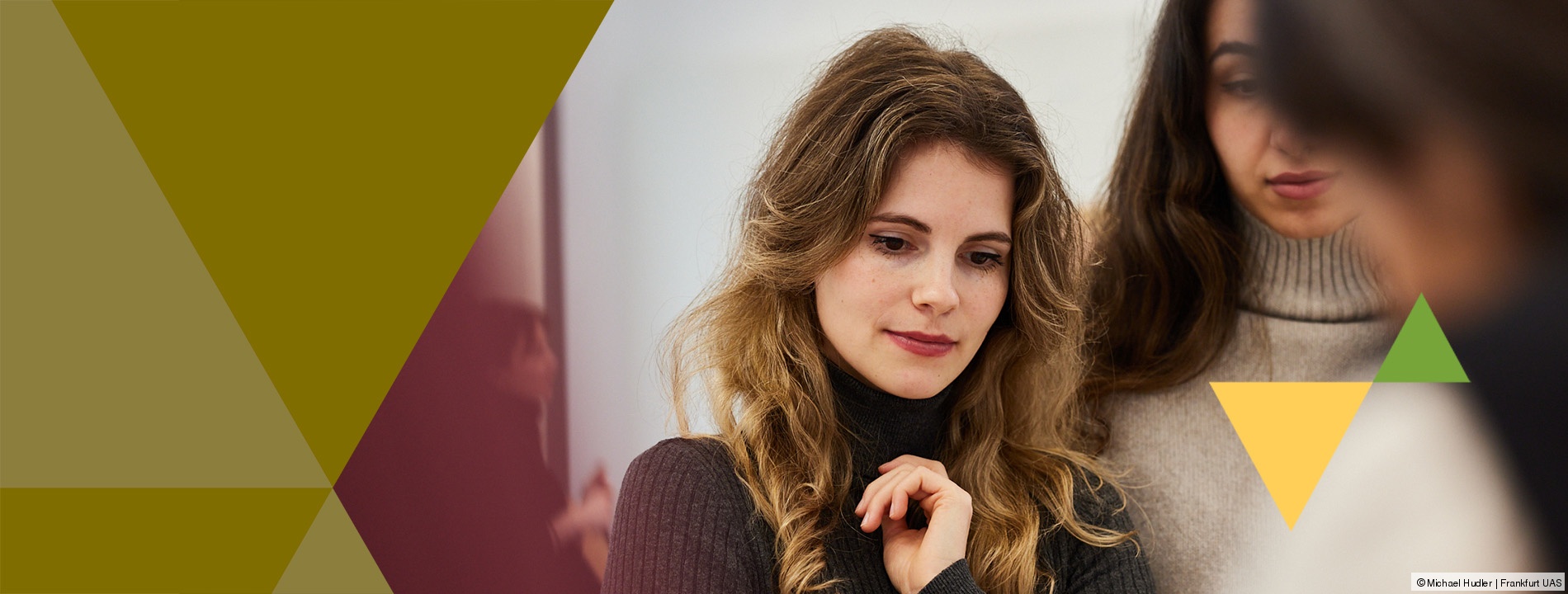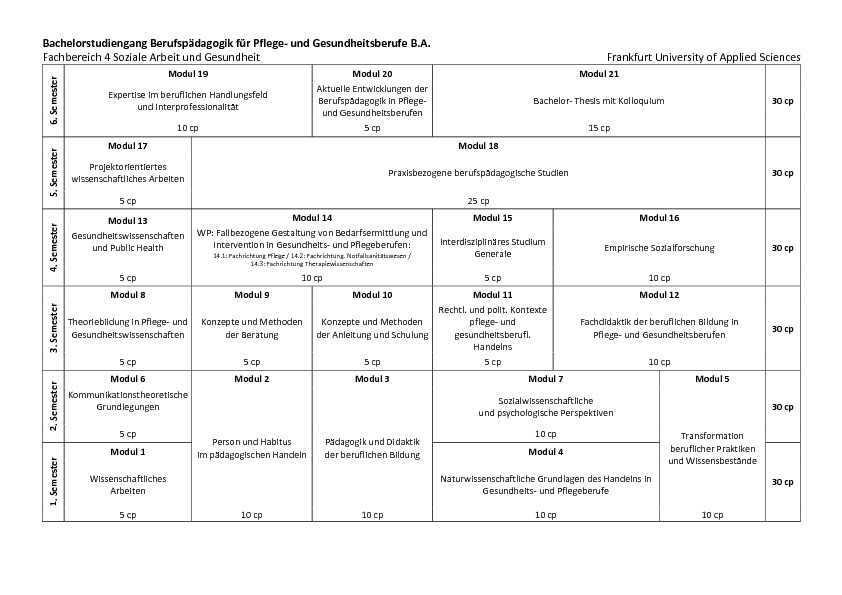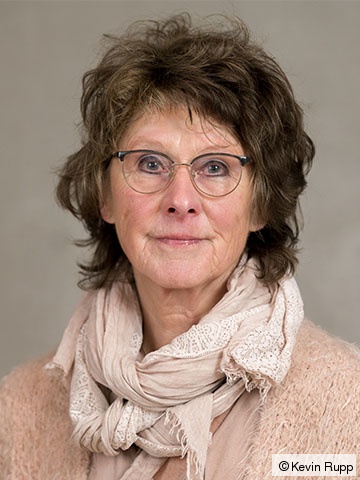Information for prospective students of Vocational Education in Nursing and Healthcare Professions BA
In the summer semester 2018 the new bachelor degree course BA Vocational Education in Nursing and Healthcare Professions started at Faculty 4 Health and Social Work of the Frankfurt University of Applied Sciences. The degree course can be concluded in six semesters of full-time studies (regular period of study) with an overall workload of 5,400 hours, is free of charge and organized on three day a week in block lectures where attendance is compulsory.
To the master program
Vocational Education in Nursing and Healthcare Professions (M.A.)
Structure and content of the degree course
We convey the knowledge and methods in the following focus areas in order to qualify our students for the stated tasks.
The students acquire within module 1 scientific work of the module cluster scientific work and research the basics of good scientific practice, as well as methods of scientific work. The module furthermore allows beyond the professional and methodical competence conveyance the expansion of the so far acquired professional habits by the dimension of scientific orientation in professional activities.
Module 16 Empirical social research takes up the social scientific and psychological perspectives conveyed in module 7 and further extends it with focus on research references. This way students will develop an understanding of paradigms and methodologies of empirical social research and research design and methods of qualitative/interpretative and standardized research.
During the fifth semester on Module 17 project-oriented scientific work enables students to further expand their expert and methodical competencies in scientific work, of which the basics were taught in the first semester and which were further strengthened and expanded in the following semesters by focusing more on scientific work in teams and projects on the one hand and on scientific work in the frame of empirical-oriented research exemplary on the other hand.
In the frame of Module 21 Bachelor thesis with colloquium the students work on own scientific, professional pedagogic-oriented questions which unfold along with the competencies acquired during the course of study in a written paper and are possibly answered through reference to empirical analysis. The students present their work results in the colloquium.
Within the first two semesters the students will acquire in Module 2 pedagogics and didactics of professional training basic knowledge of pedagogics, educational science (scientific theoretical paradigms; theories, concepts and models of educational science and pedagogics), learning psychology (learning theories…), of the educational science (transformations of learning cultures, educational concepts), as well as the competencies for the methodical transformation and inclusion of those theories, concepts and models into the design of teaching and learning arrangements in contexts and professional work in the fields of occupational pedagogics.
The parallel mentioned module Module 3 Persons and habitus in pedagogic work enables students the own confrontation and reflective adaption of the respective own personality, in the up-to-now professional biography acquired occupational habitus. This reflection and reconstruction forms the starting point for the continuation of personal and occupational development as a professional pedagogue and the related finding of the role and allows the planning of development tasks and design of personal growth potentials.
Own values and preferences are analyzed and made accessible for ethical reflection and theoretical basics for ethical reflecting foundations of pedagogical activities in fields and tasks of pedagogical accompaniment of learning subjects in the field of healthcare professions.
In Module 6 communication theoretical foundations the required competencies for communication design are conveyed for the future action as a pedagogue.
The different communication theories and models are acquired by the students and they convey different forms and methods of communication designs (moderation, mediation, non-violent communication, collegial advice and case discussion, feedback) in the context of occupational teaching and learning situations, as well as in settings of instructions, consultations and trainings in the contexts of healthcare professions.
During the third semester Module 9 concepts and methods of consultations, 10 concepts and methods of instruction and training and Module 12 professional didactics of professional education and healthcare professions build on the competencies acquired in Modules 2, 3 and 6 and focuses stronger on the application-oriented ability to take action of future pedagogues in the different fields of occupational pedagogics. Students primarily acquire competencies to perceive and design tasks in consultation, instruction and training through the acquisition of knowledge of the respective action concepts and consultation formats and their theoretical foundations in module 9 and 10. Module 9 primarily allows the competence acquisition to take on tasks in consultations, training and instructing in the frame of the professional training, continuing education, as well as the training and education of patients and relatives, Module 12 rather focuses on the conveyance of the ability to act and to reason for and develop teaching and learning situations, as well as the pedagogical development and transformation of learning topics. Students acquire competencies to apply didactic models and plan teaching and learning situations, they learn methods of learning consultations and promotion, to differentiate between different examination procedures in order to evaluate learning results and understand the conditions of self-controlled learning in the occupational context.
Module 20 focuses on current developments of occupational pedagogics in healthcare professions the dealing with future developmental tasks in the frame of occupational pedagogic fields of activity (occupational training in the era of life-long learning etc.).
The students update on the one side their competencies, which were acquired during the vocational training and further expand their knowledge on the other side in the module cluster technical discipline healthcare. This way scientific foundations are laid in Module 4 and legal and political contexts in health care professions and actions in Module 11 present competencies in the mentioned areas are taken up and updated.
The compulsory Module 14 case-related development of needs assessment and intervention in healthcare professions offers students the chance to focus on the disciplines nursing care (14.1), emergency medical services (14.2) as well as therapeutic sciences (14.3) while including the current knowledge state for evidence-based and theory-guided design of care processes and are further expanded in Module 19 expert know-how in the occupational field if further expanded, so that the foci of inter-professional thinking are merged.
Module 8 Theory formation in health care sciences enables the students to have in-depth theoretical discussions with the scientific disciplines of nursing science and healthcare science (paradigms, traditions and ways of theory formation and nursing care and healthcare sciences, understanding of health and diseases, professional theories and determinations of the work-sociological status of healthcare professions, classification systems as technical language of healthcare professions and their boundaries and reach, dialectics of hermeneutics/case understanding and evidence-basing/knowledge of rules in therapeutic action).
In Module 13 health sciences and public health particular attention is drawn to health promotion and prevention as basic strategy of action and tasks in healthcare professions.
In module 7 Social scientific and psychological perspectives students familiarize themselves with the fundamental terminology of sociology and psychology, as well as theories of socialization, sense and identity formation and understanding the meaning and chance of combining both disciplinary accesses for analysis and explanation purposes of social processes and phenomenon. In order to be able to consider respective assumptions and categorize sociological theories in paradigms and theory traditions, scientific theoretical basics are applied, which are conveyed in Module 2 pedagogics and didactics of professional formation. Via the conveyance of competencies, which is required for the perspective lesson structure in the subject social sciences, which goes beyond the aspects taught at institutions providing vocational training, seminars and continuing education in the context of healthcare professions, further aspects of this module are conveying necessary competencies among others including understanding of dynamics and processes of learning groups, which will be considered by future occupational pedagogues in their actions.
Module 15 Interdisciplinary general studies (Studium Generale) is to be attended in the fourth semester and further expands the academic habitus by the dimension of interdisciplinary thinking and working in interdisciplinary contexts. Students of the degree course Vocational Education in Nursing and Healthcare Professions enter the process of exchanging knowledge with students of other disciplines and other faculties and work together while considering their own perspective and under consideration of other discussion cultures a project questions about a transversal topic together.
In Module 5 Transformation of occupational practices and knowledge students have the chance to reflect on their professional practice and their acquired competencies and experiences and thereby make themselves accessible to a transformation.
The Module allows to critically-distanced reflect on their professional experience, which is knowingly incorporated, and evaluate it - which is ultimately considered to be the didactic transformation (practice duration is 100 hours).
Module 18 Practice-related occupational pedagogical studies allows students under consideration of the acquired competencies in the modules of pedagogical and didactical conveying of expertise (particularly Module 2, Module 3, Module 9, Module 10 and Module 12) to gather teaching experience in a clinical setting and plan, carry out and evaluate teaching-learning situations in practical instructions or practical lessons (students with experience are able to help out in the theoretical parts of the lessons at technical secondary schools). Practice-oriented studies are supported by offered reflection offers at the institution of higher education. At the same time students shall have the opportunity to carry out a project (i.e. concept development in the frame of health education) beyond the own field of activity up to this point in order to promote the interdisciplinary way of thinking and acting. The students are supported in their search for an adequate space for carrying out the practical sessions by the practice unit of the faculty.
The study program
Admission restrictions
- Higher education entrance qualification in accordance with §54 Higher Education Act (HHG) and
- completed vocational training in a healthcare profession and
- one-year professional practical experience (1/2 full-time equivalent)
More information about the admission procedures can be found on the pages "Application, admission and enrollment procedures" of the Frankfurt University of Applied Sciences.
Graduates of the degree course Vocational Education in Nursing and Healthcare Professions B.A. work in institutions offering professional training, continuing education, and seminars in healthcare professions. They primarily teach practical lessons, plan and evaluate them and take on practical teaching in form of practical work and practical accompaniment of students in schools and students in a clinical setting. Thereby the theory-practice transfer is helped in common learning situations with students in school and students studying healthcare professions, and allows the connection between vocational schools and the practical aspects of the respective training and connect the various learning sites of the respective trainings (vocational schools-practical institutions). Furthermore, they continue to plan, evaluate and carry out the training of patients and relatives and topic-related consultations in healthcare. The degree course builds on existing competencies from completed vocational apprenticeships (in nursing care and healthcare professions). It takes up existing experiences from teaching and lecture tasks at vocational schools and further develops them in a course of study.
The Bachelor degree prepares as a first professionally qualifying academic degree for studying a consecutive Master's degree.




